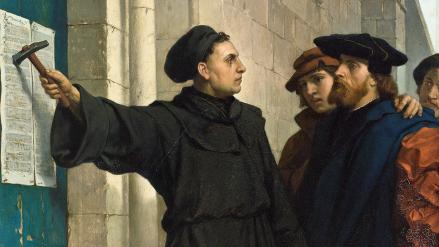A year has passed since western Christendom began its quincentennial celebration of the Protestant Reformation. Martin Luther’s memorable act of nailing ninety-five theses against the sale of indulgences to the door of a church in Wittenberg on October 31, 1517, can once again be viewed in light of the present.  Today, many Christians of the west remember the event as one of liberation from the straitjacket of medieval superstition. Others see it as the sundering of a unitary civilization which, however flawed, provided a Christian basis for most of the human experience. But all would have to agree that something has gone terribly wrong with our culture in the past five hundred years.
Today, many Christians of the west remember the event as one of liberation from the straitjacket of medieval superstition. Others see it as the sundering of a unitary civilization which, however flawed, provided a Christian basis for most of the human experience. But all would have to agree that something has gone terribly wrong with our culture in the past five hundred years.
The conventionally stark alternatives of interpreting the Reformation are softened in a commemorative article appearing today in First Things, one of the best and most influential journals about modern Christendom in America. In “The Reformation We Need” Carl Trueman writes about the failures and shortcomings of western Christianity today, and relates them to the legacy of the Reformation.
As expected, the Orthodox Christianity of the east remains totally unmentioned in the article. This can be attributed in part to the fact that the Orthodox did not contribute to or participate in the disputes that divided and ravaged western Christendom during the centuries that followed 1517. But it is interesting to observe the author using the adjective “orthodox” in lower case all the same. For Trueman, the commemoration of the Reformation ultimately comes down to a search for Christian authenticity, and this adjective in its lower case form provides the most effective way of denoting that condition. And so, orthodox Protestantism and orthodox Roman Catholicism are placed side by side, with a call to each to entertain the thought of a “new Reformation” that would reinvigorate each.
Two words are striking here. The first is indeed “orthodoxy.” The Greek word orthodoxia, to my knowledge, appears for the first time in church history in the early fourth century, within the context of disputes about apostolic tradition and doctrinal purity. Eusebius of Caesarea used it in this way in his History of the Church. The second word is “reformation.” It has a Latin origin and appeared later, especially in the context of efforts by advocates of the papacy to improve the conditions of western church life in the tenth and eleventh centuries. Reformatio became the rallying cry of those who ultimately claimed papal supremacy over all other ecclesiastical authorities, achieving remarkable improvements in church life but at the expense of the Great Schism, which separated the west and the east in 1054. In 1517 the cry of reformatio was again heard in the west, but this time it channeled opposition to the papacy and the Roman Catholic Christianity that after five centuries had become inseparable from it.
In a certain sense, words belong to anyone who decides to make use of them. But these words are so shaped by the waters of the distant past that to use them only within the context of the recent past–that is, five-hundred-year–is inevitably one-sided. Or perhaps in this case it is better to say it is two-sided, that is, Protestant and Roman Catholic. It is flat, and lacks the third dimension of the east and its Orthodoxy. Would that our understanding of modern Christianity and Christian civilization be shaped by a vision deeper than that of the past five hundred years, or even one thousand years!
Trueman’s effort to find good in both Protestantism and in Roman Catholicism is commendable, and I readily join him in it. But the real lessons of 1517, as we today leave the Reformation quincentennial behind, are also to be found in the deeper recesses of a past when Orthodoxy with a capital “O” prevailed throughout Christendom, east and west. For a thousand years no wholesale reformatio was deemed necessary. But since that time, Trueman suggests, two doctrinal tendencies have come to threaten authentic Christianity in the west: the papal infallibility of Roman Catholicism and the sola scriptura of Protestantism. Both are the result of a reformation.
If there is in our time a need for reformatio, perhaps it is to undo those earlier Reformations that have taken us so far away from our more original orthodoxia.
Photo credit: Wikimedia Commons
Good to hear from you again, Father. Will this appear soon in the Ancient Faith podcast series?
Fr. David Hudson
________________________________
LikeLike
Thanks for asking, Father David. Most of the content of this blog is distinct from the podcast, so I don’t expect this posting to appear there any time soon.
LikeLike
Hello–
Will you be publishing a book on this same topic any time soon? I love the podcast.
LikeLike
Yes, I have the first volume already written and scheduled for release through Ancient Faith Publications this summer. It will cover the period from the origins of Christendom to the first millennium. Volume two on the period from about 1000 through the Reformation is next.
LikeLike